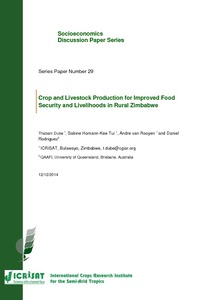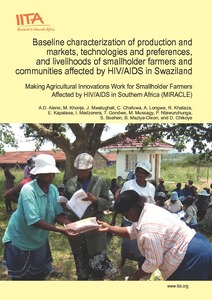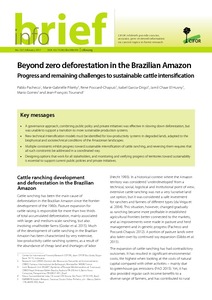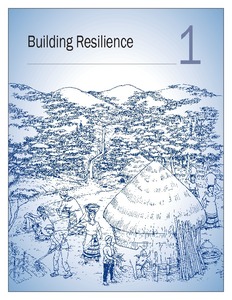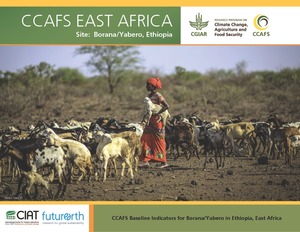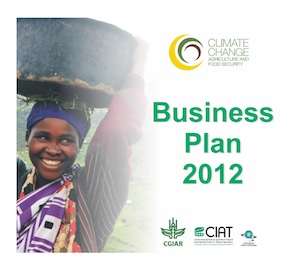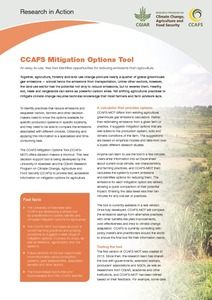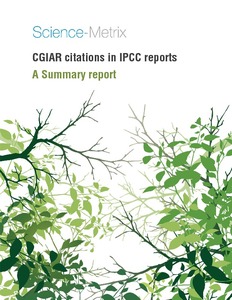Baseline characterization of production and markets, technologies and preferences, and livelihoods of smallholder farmers and communities affected by HIV/AIDS in Swaziland
Beyond zero deforestation in the Brazilian Amazon Progress and remaining challenges to sustainable cattle intensification
Key Messages
• A governance approach, combining public policy and private initiatives was effective in slowing down deforestation, but
was unable to support a transition to more sustainable production systems.
• New technical intensification models must be identified for low-productivity systems in degraded lands, adapted to the
biophysical and sociotechnical conditions of the Amazonian landscapes.
• Multiple constraints inhibit progress toward sustainable intensification of cattle ranching, and reversing them requires that
Biotecnología y seguridad alimentaria en los países en desarrollo
Se estima que la población mundial en el año 2020 será de 7.5 billones de habitantes, con más del 80% viviendo en los países en desarrollo (FAO, 1999). Aunque los datos globales sobre producción de alimentos superan el crecimiento de la población, un análisis por regiones o países (FAO, 1993) revela que, por ejemplo, entre 1979 y 1991, la producción de alimento per capita disminuyó en 20 países de bajos ingresos y en 25 países de mediano-alto ingreso.
Building local institutional capacity to implement agricultural carbon projects: participatory action research with Vi Agroforestry in Kenya and ECOTRUST in Uganda
Background: Smallholders have begun to take advantage of a growing pool of investment in climate change mitigation. Meanwhile, early movers in this area are working to develop innovative models that will allow projects to be nancially sustainable and scalable while bene ting local actors. This study focuses on two of these projects in East Africa, managed by Vi Agroforestry in Kenya and ECOTRUST in Uganda. They engaged in a participatory action research process to identify ways that local actors could take on expanded roles within the projects.
Building resilience: Climate change, water, and food security
Can current land and water governance systems promote sustainable and equitable large-scale agricultural investments in sub-Saharan Africa?
Ever since the oil, financial and food crises of 2008, sub-Saharan Africa has witnessed a marked increase in large-scale investment in agricultural land. The drivers of this investment are varied and include growing food, water and energy insecurity as well as social and economic interests of investors and recipient countries. The shape of these investments and their eventual outcomes are equally influenced by the existing land and water governance systems in the host countries.
CCAFS Baseline Survey Indicators for Borana/Yabero, Ethiopia
This document series compiles key indicators from the three levels of the baseline for each site. Indicators include: demography and basic site characteristics of each site, rainfall distribution, changes in farming practices and land management, income sources, food security and food
sources, asset ownership by households and involvement in organisations and more. This CCAFS baseline indicator document was developed for the CCAFS site at Borana/Yabero, in Ethiopia.
CCAFS Business Plan 2012
2012 will be the second year of operation of the CGIAR research program on Climate Change, Agriculture and Food Security (CCAFS). The 2012 business plan lays out the key activities in 2012, situated within the larger strategic framework of CCAFS. At the time of writing, many of the overarching principles for the operation of CGIAR Research Programs (CRPs) are still being produced by the Consortium Office (e.g. monitoring and evaluation strategy), so some of the proposed activities in 2012 may need to be modified as the year unfolds.
CCAFS Mitigation Options Tool
The University of Aberdeen and CCAFS are developing a simple tool for practitioners to quickly identify and compare mitigation options for agriculture. The CCAFS-MOT tool takes account of current farming practices and growing conditions to suggest a wide range of
mitigation options. The Excel-based tool is free and downloadable from the CCAFS website.
CGIAR citations in IPCC reports: a summary report
In March 2015, Science-Metrix was contracted by CGIAR to evaluate the presence of CGIAR publications in the IPCC assessment reports (ARs). The study was carried through the analysis of the IPCC ARs' references.

